Preventing Sexual Dysfunction
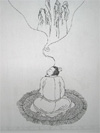 |
| A practicing Taoist |
The Chinese have one of the earliest writings on sex which is referred to as the "Chamber Skills". Its source can be traced back over 2,000 years ago. In 1974, excavations of the Mawangdui tomb discovered not only medical writings dating back to 168 BC, but also the earliest preserved sex monographs. The main purpose of the monographs was to pursue longevity and health through sex. They contained a large amount of details on therapies and prescriptions for sexual dysfunction. Sex was an important life nourishing measure in Taoist practice too. In Taoism, a healthy and balanced sexual relationship mirrors the harmony of nature and contributes to one's longevity. Most of all, moderation is recommended; it is thought excessive sexual activity depletes yin in men and yang in women.
Strong libido relies on an abundance of kidney essence (jing) and smooth coordination of the organs. Total body health is essential for good sex to occur. Because kidney essence is made up of an acquired element from proper nutrition that is transformed and transported by normal spleen function, food therapies can also be used to enhance sexual function. Additionally, qi-gong practice can help maintain a harmonious internal environment and normal organ function. Thus both of these activities may go a long way in the prevention of sexual dysfunction.
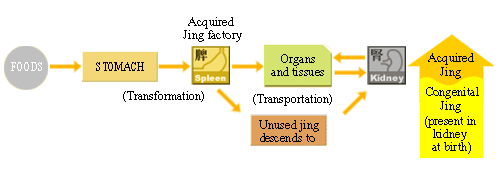
Chinese Diet for Impotence
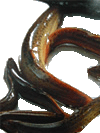 |
| Pond loach |
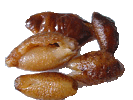 |
| Sea cucumber |
A good dietary habit plays a vital role in reducing health risks. Foods and herbs share the same sources. That means food not only provides nutrients that the body needs, but it also can cure health problems via their therapeutic actions. Since impotence is mainly attributed to kidney function, it is advisable to consume foods that tonify the kidneys and strengthen yang. Samples of foods that do this are pond loaches, sparrows and sparrow eggs, mutton, animal testicles and penis, geckoes, Chinese chives, sea horses, sea shrimp, walnut kernels, sea cucumber and mussels.
In addition, special therapeutic diets can be consumed regularly and frequently to nourish the body. These are designed to assist the body in healing itself and maintaining libido. Below lists some sample recipes. Individuals can choose one or two for regular consumption based on their own conditions.
1. Stewed duck with Cordyceps (Chinese Caterpillar fungus)
Benefits: Cordyceps are considered a superior tonic that invigorates the kidneys and lungs and replenishes essence. When cooking with matured duck, it becomes a delicious dish itself. This recipe invigorates lung and kidney functions, and restores the essence. It is especially suitable for individuals with declined sexual function.
Ingredients:
| |
|
a whole male matured duck (about 1kg) |
| |
|
Cordyceps (10 pcs.) |
| |
|
4 spoons rice wine |
| |
|
a few slices of green onion and fresh ginger |
| |
|
seasoning powder and salt |
|
|
Methods: The whole duck is rinsed in warm water and drained. Place it in a large casserole. Put in the cordyceps, wine, green onion and ginger slices, add water until all the ingredients are covered. Bring to a boil, then turn the heat down to simmer for about two hours until the duck meat is tender. Mix the seasoning powder and salt to taste in the pot. Continue cooking for another 15 min.
Serve the duck meat and thick soup in the morning and evening, one small bowl each time. Individuals who have indigestion or stomach distention are not suitable to use this recipe.
2. Fresh shrimp fried with Chinese chives
Benefits: It benefits the kidney-yang and is suitable for kidney deficiency due to debility of the vital gate fire.
Ingredients:
| |
|
Chinese chives (150g) |
 |
| Chinese chives, shrimp, rice wine and ginger. |
|
| |
|
fresh shrimp (250g) |
| |
|
1 teaspoon of Chinese rice wine or dry sherry |
| |
|
pinch of salt |
| |
|
1 spoon of fresh ginger mash |
| |
|
1 teaspoon of corn starch |
| |
|
3 spoons of low-sodium chicken broth |
| |
|
1/2 teaspoon sesame oil |
| |
|
1/4 teaspoon sugar |
| |
|
3 green onions chopped |
| |
|
3 spoons of vegetable oil |
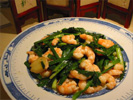 |
| Fresh shrimp fired with Chinese chives. |
Methods :
Peel and devein the shrimp, place in a small bowl; add the rice wine, salt and corn powder and marinate for 10 minutes. Wash the Chinese chives and cut into 3-inch length pieces.
Heat a wok or frying pan; add oil for stir-frying. When the oil is hot, add the ginger mash and stir-fry briefly until their flavor is released. Add the shrimp and stir fry for about 1 minute first, and then add chives to stir evenly. Add the chicken broth and sesame oil; continue for another minute. Stir in the green onion. Serve hot; this amount is good for two.
3. Congee of sparrow meat and millet
Benefits: Tonifies kidney-yang.
Ingredients:
| |
|
5 sparrows |
| |
|
millet 100g |
| |
|
1 litre / 2 pints / 4 cups water |
| |
|
1 cup of Chinese rice wine |
| |
|
few slices of fresh ginger |
| |
|
3 spoons of cooking oil |
| |
|
brown coriander seeds (10 pcs) |
| |
|
table salt |
| |
|
2 green onions chopped |
Methods:
First heat a frying pan and add oil for stir-frying. When the oil is hot, add the ginger and stir-fry briefly until its flavor is released. Put in the sparrows and stir fry for about three minutes, and then add rice wine and coriander seeds; cook for another five minutes. Put aside.
Put millet and water into a saucepan; bring quickly to a boil. Add the cooked sparrows and stir. Reduce the heat but allow the ingredients to remain at a brisk simmer. Place the lid on the pan, leaving it slightly open so the congee doesn't bubble up and spill over. In 45 - 50 minutes the congee is almost done; add green onions and table salt to taste. Makes enough for two people.
4. Epimedium spirit drink
Benefits: Tonifies kidney-yang.
Ingredients:
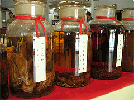 |
| Chinese herbal spirits |
| |
|
Herba Epimedii 200g |
| |
|
Fructus Lycii (wolfberry fruit) 50g |
| |
|
Scolopendra (centipede) 20g |
| |
|
1 liter of rice wine (50% alcohol) |
Methods:
Grind the first three ingredients, mix well and put into a large vessel, pour in the rice wine, seal the cover properly. Place the vessel in a warm place (25¢X Centigrade). It will be ready to serve, after being soaked for seven days.
Each time take 20 ml, twice daily. Twenty days are usually considered one session of treatment. |